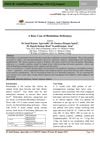 April 2024 in “Frontiers in microbiology”
April 2024 in “Frontiers in microbiology” Certain gut bacteria may increase or decrease the risk of male pattern baldness.
 September 2023 in “Medicina-lithuania”
September 2023 in “Medicina-lithuania” The study suggests that analyzing DNA can help treat hair loss, but more research is needed.
 May 2023 in “Frontiers in Endocrinology”
May 2023 in “Frontiers in Endocrinology” Thyroid disease can cause skin, hair, and nail problems, and treating the thyroid condition often improves these symptoms.
 January 2019 in “Journal of Drug Delivery and Therapeutics”
January 2019 in “Journal of Drug Delivery and Therapeutics” Changing six essential health practices can help prevent excessive hair shedding.
55 citations,
July 1983 in “Journal of the American Academy of Dermatology” Biotin supplements can effectively treat hair loss and skin issues in certain enzyme deficiencies.
 7 citations,
December 2008 in “Expert Review of Dermatology”
7 citations,
December 2008 in “Expert Review of Dermatology” The document concludes that various childhood hair and nail disorders exist, some may improve on their own, and advances in genetics and immunology could enhance treatment and counseling.
 January 2020 in “Asian journal of applied science and technology”
January 2020 in “Asian journal of applied science and technology” Good nutrition is crucial for health and preventing disease, and supplements can help prevent nutrient deficiencies.
3 citations,
October 2023 in “Cosmetics” Healthy lifestyle changes can significantly improve skin health as you age.
August 2024 in “Food Bioscience” Bifidobacterium longum BB536 metabolites may help treat hair loss by repairing and promoting hair cell growth.
 August 2021 in “Journal of medical science and clinical research”
August 2021 in “Journal of medical science and clinical research” An infant with seizures and hair loss was diagnosed with biotinidase deficiency and treated successfully with biotin.
March 1993 in “Neuroscience letters” Biotin is important for metabolism, with specific daily intake recommendations, and deficiency can cause health problems.
February 1994 in “Neuroscience letters” People need different amounts of biotin based on age and it's important for health, with many foods providing enough.
Taking too much biotin can mess up blood test results, which might lead to wrong diagnoses and treatments.

Biotin does not significantly help with hair growth.
 May 1991 in “Current problems in dermatology”
May 1991 in “Current problems in dermatology” Skin issues can indicate immune system problems.
 63 citations,
May 2017 in “American Journal of Clinical Dermatology”
63 citations,
May 2017 in “American Journal of Clinical Dermatology” People with alopecia areata often have lower levels of vitamin D, zinc, and folate, but more research is needed to understand if supplements can help treat it.
 24 citations,
July 2019 in “Journal of Obstetrics and Gynaecology”
24 citations,
July 2019 in “Journal of Obstetrics and Gynaecology” The combination therapy improved PCOS symptoms in both obese and non-obese women, with weight loss in the obese group.
 22 citations,
January 2015 in “Dermatology Research and Practice”
22 citations,
January 2015 in “Dermatology Research and Practice” An extra-strength marine protein supplement helped increase hair growth and decrease hair shedding in women with thinning hair.
 April 2024 in “International journal of clinical trials”
April 2024 in “International journal of clinical trials” SesZen-Bio™ improves hair density, thickness, and overall hair health.
 198 citations,
October 2011 in “Journal der Deutschen Dermatologischen Gesellschaft”
198 citations,
October 2011 in “Journal der Deutschen Dermatologischen Gesellschaft” Use minoxidil for hair loss; finasteride and dutasteride for men, dutasteride for women.
 81 citations,
June 2010 in “Journal of Dermatological Treatment”
81 citations,
June 2010 in “Journal of Dermatological Treatment” The document concludes that minoxidil and finasteride are proven for hair growth, herbal remedies show promise, but more research is needed to confirm their effectiveness.
 24 citations,
January 2020 in “International Journal of Molecular Sciences”
24 citations,
January 2020 in “International Journal of Molecular Sciences” Some plants with flavonoids may help treat hair loss and promote hair growth.
 23 citations,
January 2013 in “Indian Journal of Dermatology, Venereology and Leprology”
23 citations,
January 2013 in “Indian Journal of Dermatology, Venereology and Leprology” FPHL causes hair loss in women due to genetics and hormones; minoxidil and anti-androgens are treatments, and early intervention is advised.
 18 citations,
October 2018 in “Nutrients”
18 citations,
October 2018 in “Nutrients” Annurca apple extract promotes hair growth by changing hair follicle metabolism to boost keratin production.
 15 citations,
October 2017 in “Clinics in Dermatology”
15 citations,
October 2017 in “Clinics in Dermatology” Elderly abuse is often by family members, and doctors, especially dermatologists, can spot it by looking for unusual injuries and malnutrition.
 8 citations,
September 2021 in “Journal of Cosmetic Dermatology”
8 citations,
September 2021 in “Journal of Cosmetic Dermatology” Some diets and supplements might help with skin disorders, but their effectiveness varies and more research is needed.
August 2024 in “Nutrients” Probiotics help reduce hair loss and increase hair growth in people with androgenic alopecia.

Different genes cause Female Pattern Hair Loss compared to male hair loss, and treatments vary, but more research is needed to understand it fully.
86 citations,
January 1990 in “The Journal of Pediatrics” Children with partial biotinidase deficiency are healthy at birth but may develop symptoms that improve with biotin therapy.
72 citations,
October 1988 in “Archives of Disease in Childhood” Biotin treatment improves symptoms of biotinidase deficiency, but some neurological damage may be permanent.





















